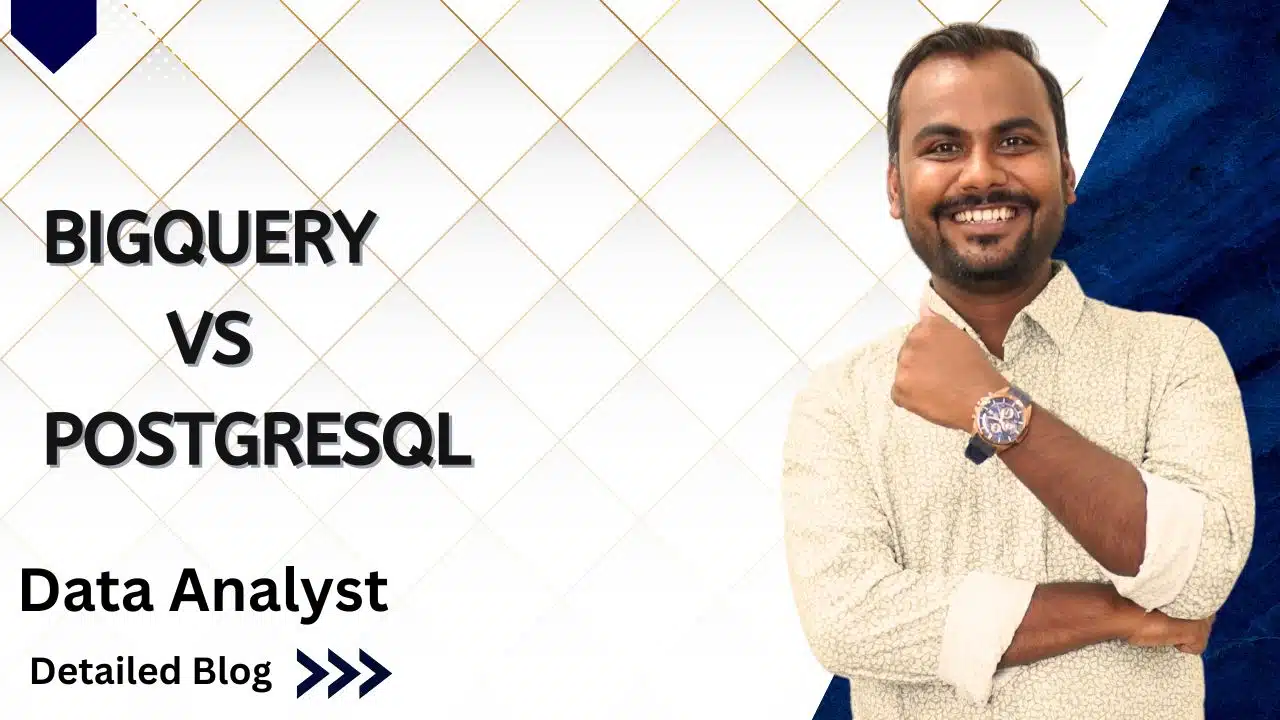BigQuery vs PostgreSQL – Which Database is Best for Data Analysts?
In today’s data-driven world, choosing the right database can make or break your analytics workflow. Two of the most powerful tools available are Google BigQuery and PostgreSQL.
If you’re taking a data analyst course or exploring the Google Data Analytics program, understanding how these two platforms differ is essential for real-world analytics success.
1. Overview – What Are BigQuery and PostgreSQL?
Google BigQuery is a fully managed, serverless data warehouse designed for large-scale analytics. It excels at analyzing terabytes of data using SQL-like queries in seconds.
On the other hand, PostgreSQL (often called Postgres) is a relational open-source database widely used for transactional and analytical workloads.
While BigQuery handles cloud-scale data effortlessly, PostgreSQL offers deep control, flexibility, and strong integration with applications.
2. Architecture and Performance
| Feature | BigQuery | PostgreSQL |
|---|---|---|
| Type | Serverless Data Warehouse | Relational Database |
| Scalability | Infinite (Managed by Google) | Vertical/Manual Scaling |
| Storage | Cloud-based (Columnar) | Disk/Server-based (Row/Column) |
| Query Engine | Distributed SQL | Local Query Planner |
In BigQuery, performance scales automatically — you don’t need to manage servers. This makes it ideal for analysts working on big data analytics.
PostgreSQL, however, offers more control over query optimization, indexes, and data models — perfect for medium-scale analytics or app-level reporting.
3. Cost and Management
-
BigQuery: Pay-as-you-go. You’re billed for the amount of data processed per query — great for occasional analysis but can get expensive for frequent querying.
-
PostgreSQL: Free and open source. You only pay for the hardware or cloud instance it runs on.
👉 For learners in a Google Data Analytics course, BigQuery provides hands-on experience with enterprise-scale analytics on real-world datasets.
Meanwhile, PostgreSQL helps data analyst course participants understand the fundamentals of relational database management.
4. SQL and Compatibility
Both BigQuery and PostgreSQL use SQL syntax, but BigQuery has some unique extensions for analytics functions (like ARRAY_AGG, STRUCT, and partitioned tables).
For anyone learning SQL through a data analyst course, mastering PostgreSQL first provides a solid base, which you can later extend to BigQuery’s analytics-specific SQL.
5. When to Choose Which
✅ Choose BigQuery if:
-
You handle large-scale analytics or billions of records
-
You prefer serverless management and scalability
-
You’re using the Google Data Analytics ecosystem
✅ Choose PostgreSQL if:
-
You work with moderate-sized datasets or on-prem databases
-
You want full control over configuration and optimization
-
You’re learning database concepts through a data analyst course
6. Integration for Data Analysts
-
BigQuery integrates seamlessly with Looker Studio, Tableau, and Google Sheets for data visualization.
-
PostgreSQL connects easily with Power BI, Python (pandas), and R, making it flexible for data analytics projects.
Both are critical tools for any data analyst — understanding them helps bridge the gap between local analytics and cloud-scale insights.
Conclusion
Understanding the difference between correlation and causation is one of the most important analytical skills for anyone working with data. While correlation helps identify relationships, causation digs deeper to uncover the why behind the numbers. Analysts who can distinguish between the two make smarter, data-driven decisions and avoid costly misinterpretations.
At Learnomate Technologies, we make sure you not only understand such cutting-edge features but also know how to implement them in real-world projects. Whether you’re a beginner looking to break into the database world or an experienced professional upgrading your skillset—we’ve got your back with the most practical, hands-on training in Oracle technologies.








Let’s keep learning, exploring, and growing together. Because staying curious is the first step to staying ahead.
Happy learning!
ANKUSH








